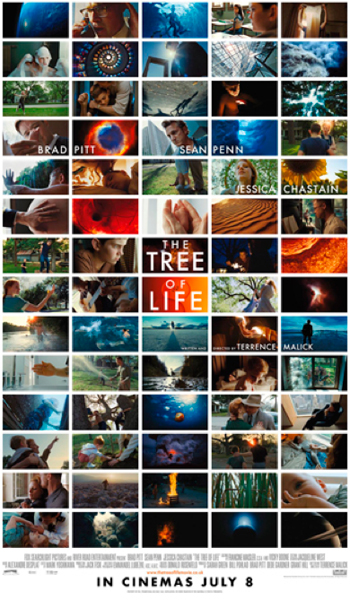The Tree of Life ***
 Film-maker Terrence Malick is an enigma, much like his films. With secrecy and speculation surrounding his latest ‘creation’ at Cannes this year, the industry prepared itself to be in awe of another Malick abstraction. And it didn’t disappoint Robert De Niro and jury, as The Tree of Lifewon the coveted Palme d’Or.
Film-maker Terrence Malick is an enigma, much like his films. With secrecy and speculation surrounding his latest ‘creation’ at Cannes this year, the industry prepared itself to be in awe of another Malick abstraction. And it didn’t disappoint Robert De Niro and jury, as The Tree of Lifewon the coveted Palme d’Or.
Opening with a quotation from the Book of Job, when God asks, “Where were you when I laid the earth’s foundation … “, the story is an impressionistic one that refers to the concept of a multi-branched tree, where the idea that all areas of life (theology, philosophy, mythology etc) are interconnected. The tree also acts as a metaphor for the human spirit. The story then follows the origins of life and its creation and meaning through the experiences of one 1950s Texan family – headed by strict patriarch Mr O’Brien (Brad Pitt) – that suffers a tragic personal loss in the process. In the present day, one of the three sons, Jack (Sean Penn), still struggles to come to terms with his loss and his father’s influence on his character.
The Tree of Life is yet another meticulously crafted and richly depicted Malick signature piece, full of the wonders of nature, the power of lone narration and emotive music, and fond memories of yesteryear. However, this time, it feels like the elusive film-maker has become more indulgent than before, using less subtle musical emphasis and being almost subversively disparaging to those who embrace and take comfort in nostalgia, as he allows his fragile screen family life to unravel and never reach a comforting conclusion.
There is a lot of extravagant visual padding, which Malick fans will embrace, such as the celestial lights hinting at a greater being and our maker (look closely at the very last illuminated image, in particular), and footage of the earth ‘being born’ and evolving. There are even spurious dinosaur scenes, like something from BBC’s Walking With Dinosaurs that just need an Attenborough narration over them to make them complete. However, non-Malick aficionados may take umbrage at all this lavishness, seemingly superfluous nature-cosmos trail, expecting more screen time for their buck with the film’s top-billed names, Pitt and Penn.
It is the family dynamics that are the main crux and interest of the whole evolutionary story of how children copy habits from their elders and form personalities through a range of influences, almost pre-conditioned by the time they’ve even had a stab at independence in the adult world. It’s this head-spin – triggered by bad news – that sends Penn’s character Jack into near meltdown, allowing Malick to visualize this with some stunningly constructed and contorted shots, before Jack is ‘comforted’ by a higher presence. However, moving backwards and forwards in time gets very confusing, and merely emphasizes how overly long the film is – even allowing for pause for thought and time occurrences.
In terms of the acting, Pitt, Penn and the rest of the cast, including highly impressive newcomer Hunter McCracken as a young Jack are top of their class, as though Malick has painstakingly given them as much guidance and encouragement to draw the best out of them. McCracken is reminiscent of a young River Phoenix as his performance echoes scenes like those in the iconic, 1986 coming-of-age drama, Stand By Me. As in that film, there is a timeless, dreamy quality at moments, when we try to pointlessly slow down the rapid loss of youth, innocence and adventure.
Very much ‘poetic art-house meets mainstream’, The Tree of Life moves in and out of time and space to prove how small we are in the greater universe, how our predisposition is either governed by ‘nature’ (hardwired, like Jack and his father) or by ‘grace’ (carefree and creative, like Jack’s brother). It’s the connections between our vulnerable mindset and the universe’s many elements that make for compelling post-debate, but are portrayed by an almost perfectionist cinematic artist, whose vision is certainly an acquired taste.
3/5 stars
By @FilmGazer